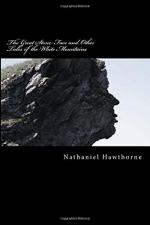‘Fear not, Ernest,’ said his heart, even as if the Great Face were whispering him—’fear not, Ernest; he will come.’
More years sped swiftly and tranquilly away. Ernest still dwelt in his native valley, and was now a man of middle age. By imperceptible degrees, he had become known among the people. Now, as heretofore, he labored for his bread, and was the same simple-hearted man that he had always been. But he had thought and felt so much, he had given so many of the best hours of his life to unworldly hopes for some great good to mankind, that it seemed as though he had been talking with the angels, and had imbibed a portion of their wisdom unawares. It was visible in the calm and well-considered beneficence of his daily life, the quiet stream of which had made a wide green margin all along its course. Not a day passed by, that the world was not the better because this man, humble as he was, had lived. He never stepped aside from his own path, yet would always reach a blessing to his neighbor. Almost involuntarily, too, he had become a preacher. The pure and high simplicity of his thought, which, as one of its manifestations, took shape in the good deeds that dropped silently from his hand, flowed also forth in speech. He uttered truths that wrought upon and moulded the lives of those who heard him. His auditors, it may be, never suspected that Ernest, their own neighbor and familiar friend, was more than an ordinary man; least of all did Ernest himself suspect it; but, inevitably as the murmur of a rivulet, came thoughts out of his mouth that no other human lips had spoken.
When the people’s minds had had a little time to cool, they were ready enough to acknowledge their mistake in imagining a similarity between General Blood-and-Thunder’s truculent physiognomy and the benign visage on the mountain-side. But now, again, there were reports and many paragraphs in the newspapers, affirming that the likeness of the Great Stone Face had appeared upon the broad shoulders of a certain eminent statesman. He, like Mr. Gathergold and old Blood-and-Thunder, was a native of the valley, but had left it in his early days, and taken up the trades of law and politics. Instead of the rich man’s wealth and the warrior’s sword, he had but a tongue, and it was mightier than both together. So wonderfully eloquent was he, that whatever he might choose to say, his auditors had no choice but to believe him; wrong looked like right, and right like wrong; for when it pleased him, he could make a kind of illuminated fog with his mere breath, and obscure the natural daylight with it. His tongue, indeed, was a magic instrument: sometimes it rumbled like the thunder; sometimes it warbled like the sweetest music. It was the blast of war—the song of peace; and it seemed to have a heart in it, when there was no such matter. In good truth, he was a wondrous man; and when his tongue had acquired him all other imaginable success—when it




